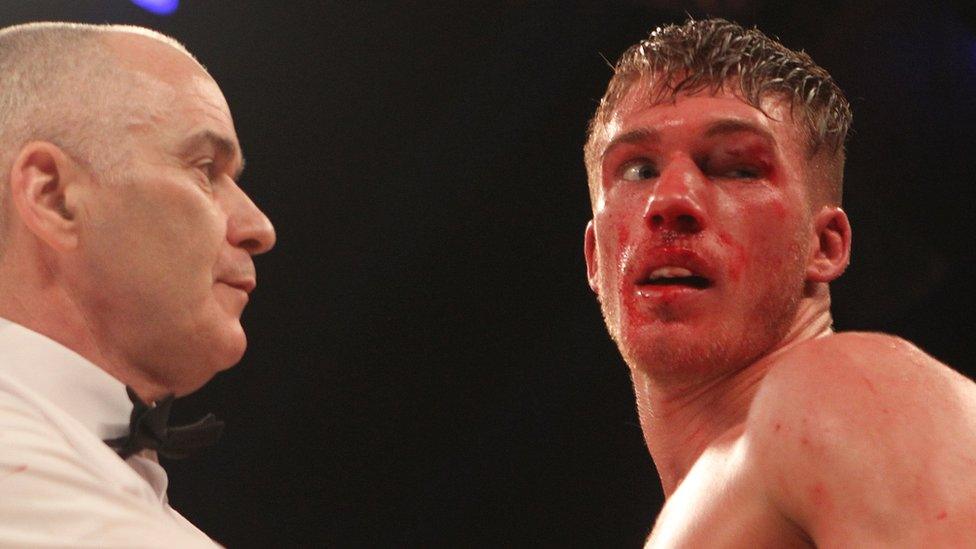For the love of boxing: Why fighters still compete in the 'toughest of sports'
- Published
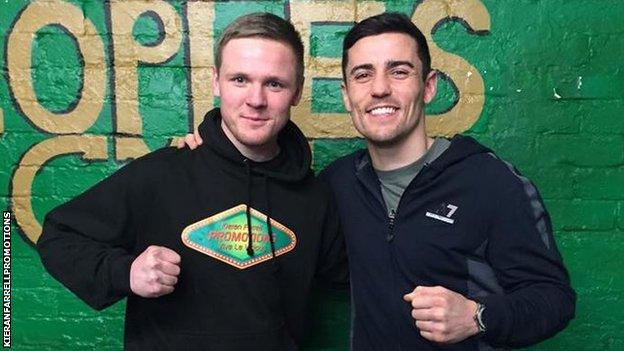
Anthony Crolla (right) visits Kieran Farrell at The People's Gym
It is four years since Kieran Farrell's dreams of becoming a world champion were ended and the eyes that were once set on boxing's biggest prize instead welled with tears as a brain injury forced him to retire from the sport aged 22.
Farrell was recently awarded the British Empire Medal and a British Boxing Board of Control outstanding achievement prize for his services to a sport that nearly killed him.
But it is a poignant story, too, in a year when boxing suffered the death of Mike Towell following a fatal head injury and witnessed the high-profile retirement of Nick Blackwell at 25 after a bleed on the brain in March.
It is perhaps unsurprising that the World Medical Association describes boxing as a "very bad idea" and a "dangerous sport" which should be banned.
Despite that advice, hundreds of boxers take to the ring across the country every week, and not one of those, nor the thousands more who pay to watch them, would agree that their centuries-old sport should be brought to a halt.
'My mum saw her son basically dying in front of her'
It was December 2012 when Farrell went the distance with Anthony Crolla as they fought for an English title in Manchester.
Farrell collapsed in his corner before the judges could announce the decision, slipping into a coma because of a bleed on the brain and only waking in hospital to hear the result had not gone his way.
Farrell spent a week in intensive care. Crolla went on to become WBA lightweight champion of the world. Farrell was told he could never fight again.
"From the fifth round on I could feel the swelling on my head," says Farrell.
"Anything that went near it was cringing pain. I fought on. It came across my mind to say something about it, but I decided not to mention it because I knew my coach would have pulled me out."
Farrell admits his family suffered the most in the weeks and months following the fight, although the frustration at not being able to do everyday things was enough to nearly break a man used to running eight miles each morning.
"My mum was in the back of the ambulance when I was fitting and she saw her son basically dying in front of her," he explains. "My brother had depression and put a lot of weight on. It still haunts him.
"For me, I woke up out of a coma and just wanted to get out of hospital. I thought I was in the wrong place, I thought I was all right.
"I remember sitting at the end of my bed trying to put my socks on and I couldn't because I was dead stiff and didn't know how. I started crying. My mum put my socks on for me.
"My brother brought me some beans on toast with two poached eggs - I used to like that. I was sitting on the end of the bed and I spilled the beans. I tried cutting my toast in half and I was using the back of my knife."
'I wouldn't do things differently'
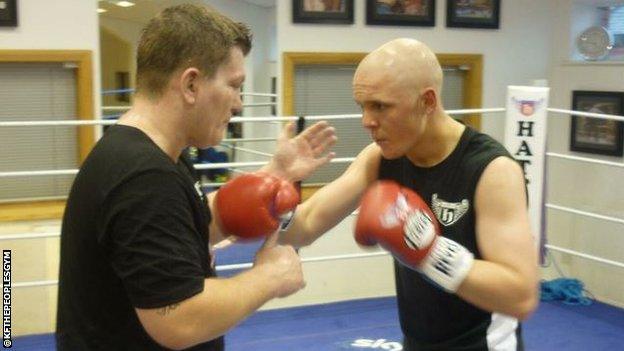
Farrell's defeat by Crolla was the only loss of his 15-fight professional career
Four months after the fight, Farrell visited a neurosurgeon and was told he was "very lucky" to be walking through the door and that, thankfully, the bleed on his brain had dispersed.
No-one would have blamed him for walking away from the sport. Instead, he tried three times, unsuccessfully, to reapply for his boxing licence.
"I started doing my own research on brain injuries, trying to do a bit of homework," says the 26-year-old father of two. "I just wanted to know I could fight again if I needed to."
Since Farrell's final bout, two British boxers have died from head injuries - Michael Norgrove in 2013 and Towell this year - but the lightweight has no regrets about taking the fight that nearly added him to that list.
He says: "There's no hindsight in it. I had a stake in the fight. There's no way I would say 'I'd do things differently'.
"I believed I was going to be world champion. It could have been Manny Pacquiao or Floyd Mayweather - I would have stepped into the fight believing I was the best and I couldn't be touched.
"The only thing I have ever known from seven years old is boxing. Even at primary school my teachers would ask 'what do you want to do?' and I would say I wanted to be a professional boxer.
"That's what I did. I got to age 18 and turned professional and when I was doing that there was nothing else that I ever thought of.
"I worked for my dad tarmacking, but that was just to get a few quid to get taxi money to get to the gym. There was nothing else, ever, so it never crossed my mind that I wanted to get away from boxing because it is all I know."
With cases such as Farrell, Norgrove and Towell followed by the retirement of Tommy Martin in October because of a bleed on the brain, some critics have described the sport as "senseless"., external
But researchers from the University of South Wales suggest, external boxing is "rooted in certain societies" and fighters can gain heroic status by embodying "the values and ideals of the communities from which they came".
'I've never even had an argument'
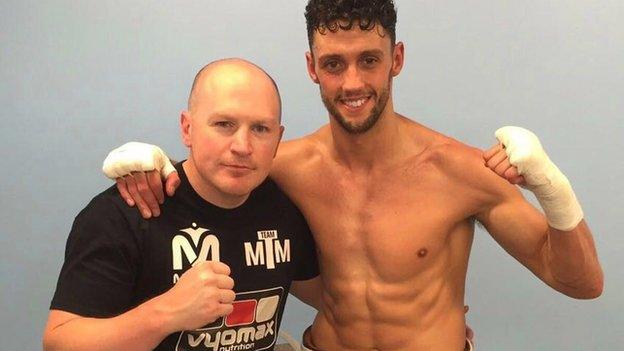
Matty Mainwaring (right) has been training with Matthew Hatton for 18 months
Farrell's business is now to encourage others to step into the ring. He has 10 professionals on his books at The People's Gym he owns in the aptly named Wham Street in Rochdale, trains dozens of children, some as young as three years old, and has also entered the promoting game.
On the weekend of Farrell's next promotion, Friday, 18 November, 92 professionals and hundreds more amateurs are due to fight across the UK, boxing for everything from regional area titles to international and inter-continental belts.
Matty Mainwaring fought on both Farrell's first two cards. The 26-year-old middleweight's record reads 4-0, but his is a curious case in that he arrived in boxing via a professional football career.
Mainwaring calls boxing "the toughest of sports" and admits football seemed easy compared to twice-daily sessions with his trainer Matthew Hatton, extra evening runs and sparring sessions in "intimidating old-school gyms".
Mainwaring's motives for stepping into the ring are about discipline, skill and respect.
"I'm not an aggressive person. I just love the sport," says Mainwaring, who counts Hull City and Stockport County among his former clubs. "I've never even been in an argument outside the ring.
"People naturally have this thing that you have to be aggressive. They look at a lad that fights a lot in the street - they probably think he would make a good case.
"It's your technique, your boxing brain, your natural speed and coordination. You have to be aggressive, but that comes out in the ring and nowhere else."
The Salford fighter also thrives on the one-on-one nature of a sport in which he says "everybody respects everybody".
"Every lad you get in the ring with is going through what you are going through," he adds. "You look across the ring and he's probably thinking the same thing - you know in about 30 seconds' time it's going to be on."
Farrell agrees: "Boxing is a unique sport for the reason being that we can knock 10 lumps out of each other and we have respect for each other. There is no hate in the game - 99% of it is all love."
'Everyone dreams of fighting in Las Vegas'
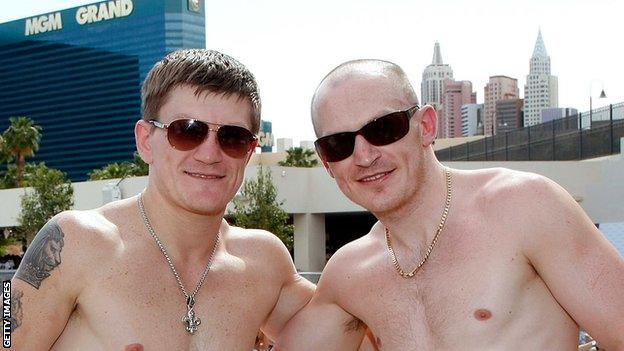
Matthew Hatton (right) with brother Ricky before the pair both fought on the same card at the MGM Grand in Las Vegas in 2009
Perhaps that respect is more evident when you visit the smaller, more intimate venues where fighters with a handful of wins are attempting to make a name for themselves.
Mainwaring's trainer Hatton calls these "the bread and butter" bouts and, for him, they are where a boxer's career is forged.
"We have all started somewhere," says Hatton, whose 52-fight professional career took him to the MGM Grand and City of Manchester Stadium.
"Every fighter's dream is to be fighting in Las Vegas, topping the bill in the huge stadiums, but the small shows are where you really learn the game.
"I remember early on fighting as a pro in empty halls. These little fights and tests early on, it's all mentally challenging and if you can come through it will stand you in good stead."
A long way from the reported £130m Floyd 'Money' Mayweather earned in boxing's "fight of the century" with Manny Pacquiao last year, Mainwaring says he had to dig into his football savings to make ends meet during his first couple of fights.
"The lads really do earn their money for the sacrifices they have got to make," Hatton explains.
"However, there is a good saying in boxing: your first 10 fights are for learning; after that it is time to start earning."
Stepping away from the ring and into the corner has also made Hatton more aware of the risks his fighters face, but the 35-year-old believes boxing authorities do all they can to minimise the dangers.
Dr Louise Eccles, the chief medical officer of the British and Irish Boxing Association, says boxers must have a thorough annual medical and MRI head scan, an optician's report and blood tests, as well as a pre-fight medical.
"If the doctor is not happy with the boxer's condition, the fight will not go ahead," she says.
Hatton stresses the importance of trainer's role on fight night: "It is not just about preparing these guys for the fights. Your job as a coach is to protect them on the night as well. You have got to be really on the ball. You can't get caught up in the thick of it - that is easy to do.
"Boxing is a sport that will never be 100% safe, but there are accidents in all sports. Egos have got to be put to one side and it is all about the safety of the fighters."
But Dale Evans, Towell's opponent on that fateful September night in Glasgow, says boxers wrongfully adopt an air of invincibility when they are in the ring.
"You think you are safe, but you are not," he told BBC Radio Wales Sport recently.
"You never think it will happen. You know the risks, but with the medical people there, an ambulance outside and having your corner people to pull you out, a boxer will fight until they can't fight no more."
'I hated him, he probably hated me'
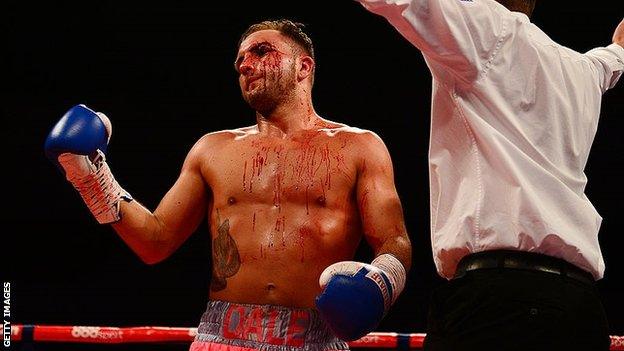
Dale Evans is stopped due to a serious head wound during a fight in 2014
Evans was forced into a dark place following the fight, but was "touched" by the reaction he got at Towell's funeral in October. The Welshman, 24, said that has given him the incentive to try and achieve "Mike's dream" of winning a British title.
As for Farrell, he took great pleasure in seeing Crolla win the WBA lightweight crown in 2015.
The nature of boxing's "family", though, was summed up for him when Crolla attended Farrell's first show as a promoter in front of a few hundred fans at Middleton Arena, four miles from Farrell's home.
"Ant's a good friend of mine. Any time I want to talk to him, he's always at the end of the phone. He's a top kid," Farrell says.
"Ant and I were friends before we fought and then for the five weeks we knew we were fighting each other I hated him. He probably hated me.
"But it's not Ant's fault it happened. It is just one of those things. Ant has done me the world of good by over-excelling what he thought he could do in the sport."
- Published20 October 2016
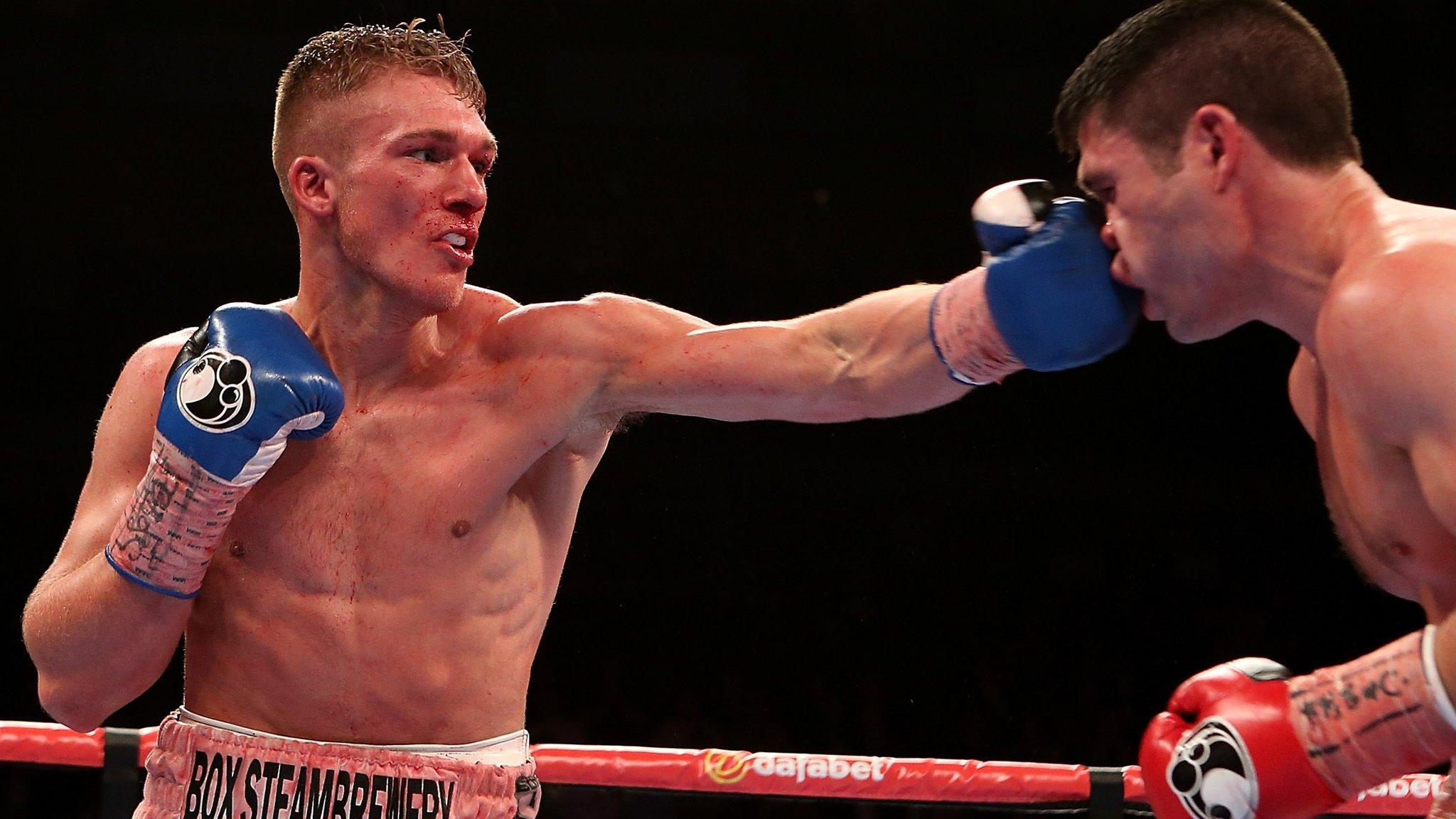
- Published19 October 2016
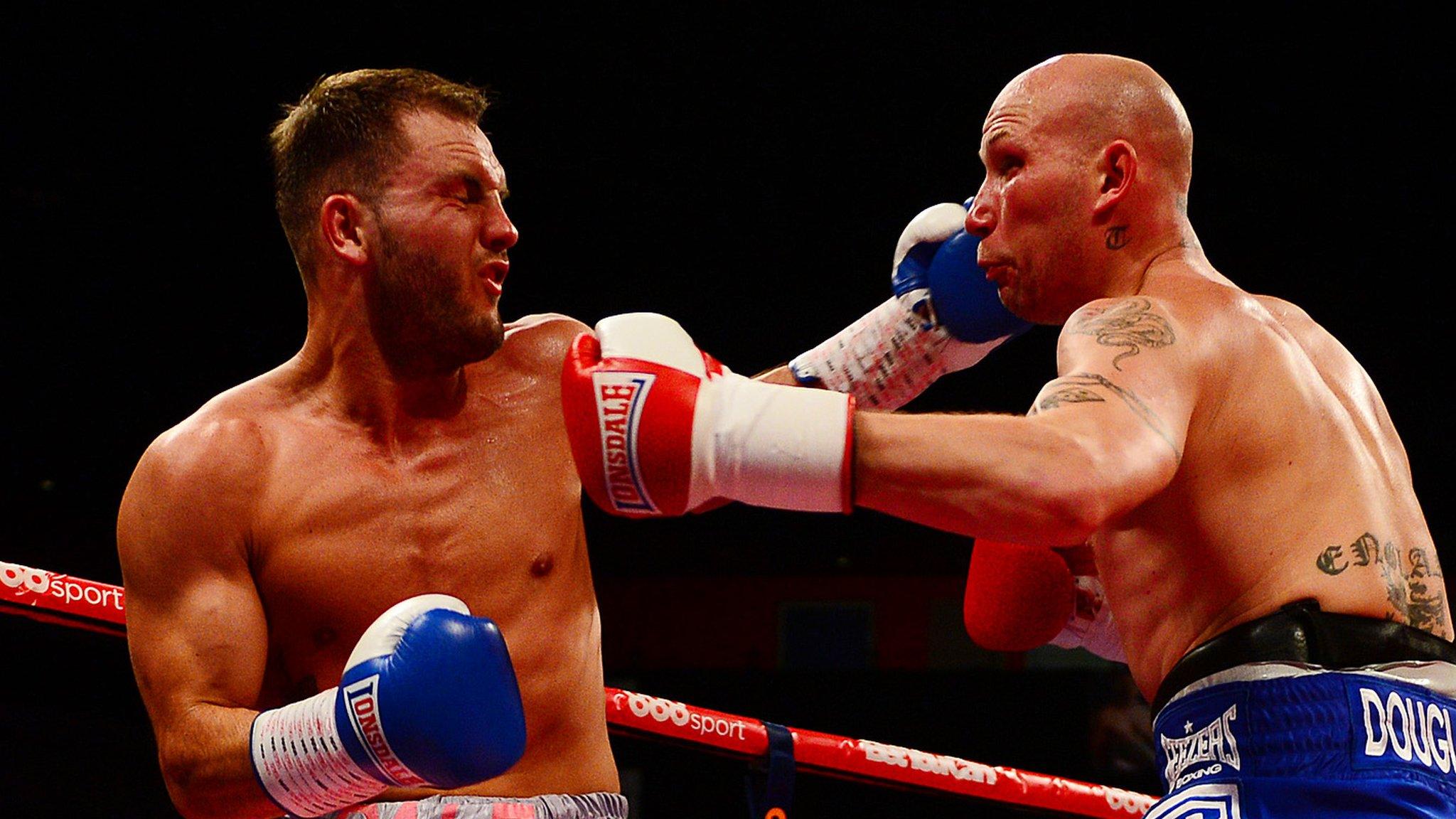
- Attribution
- Published1 October 2016
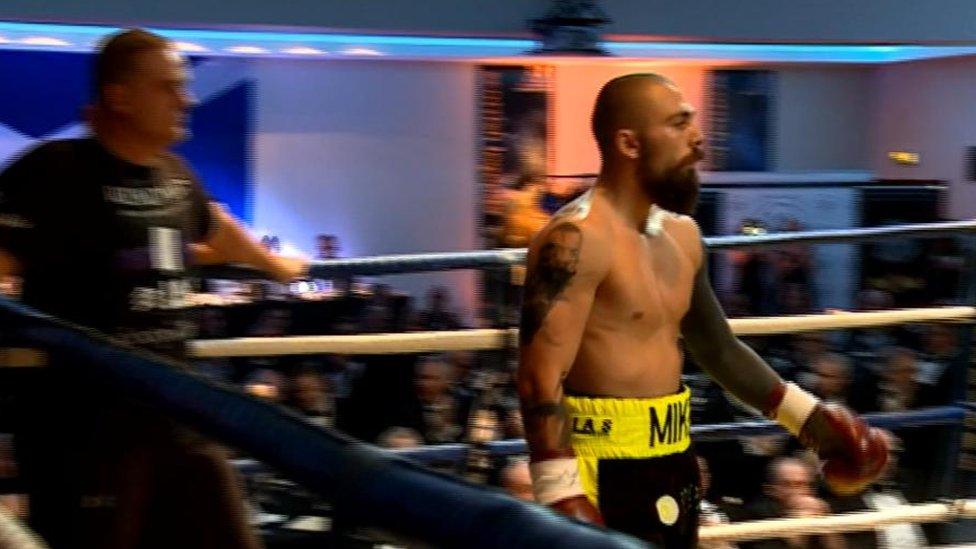
- Published19 April 2016
